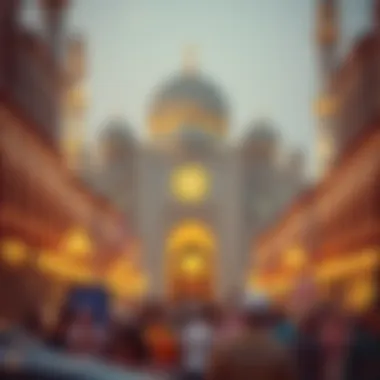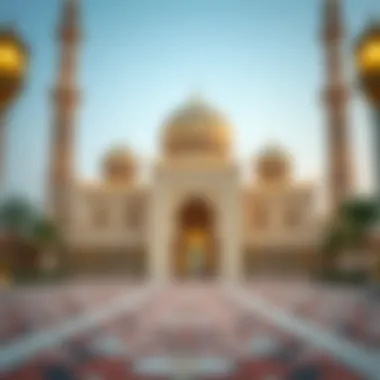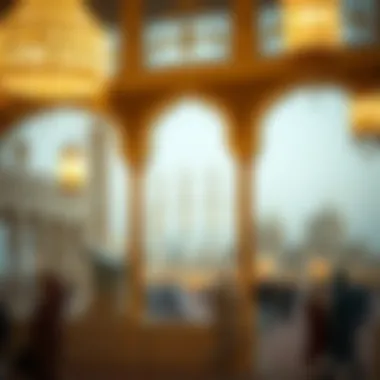Eid Holiday 2023 in UAE: Traditions and Insights


Intro
The Eid holiday in the United Arab Emirates stands as a vibrant testament to the rich cultural tapestry woven over centuries. It symbolizes joy, reflection, and unity among the diverse communities that call this nation home. As 2023 approaches, the anticipation for Eid grows, not just as a festive occasion but as a pivotal point for many in terms of social and economic interactions.
During this time, families and friends gather, share meals, and exchange greetings that resonate with goodwill. The holiday fosters a sense of belonging and community, transcending the individual to embrace a collective ethos. For expatriates and locals alike, it’s a moment when cultural values are shared and celebrated openly, enhancing the character of the nation.
The impact of Eid extends beyond personal connections to the broader economic landscape, particularly in real estate and tourism sectors. Understanding the nuances of these interactions can provide valuable insights for investors and homeowners.
As we explore the significance and rituals of Eid in the UAE, we will also look at how these practices influence market trends and investment strategies. The narrative is not solely about tradition; it’s about how culture interlinks with commerce, creating a unique atmosphere that sets the UAE apart.
This article aims to unravel the various dimensions of the Eid holiday, focusing on its significance, the ways it is celebrated across different emirates, and its broader implications on market dynamics.
Eid Holiday Overview
Eid, a treasured occasion in the Islamic calendar, emerges not just as a celebration but as a profound cultural touchstone. In the United Arab Emirates, Eid embodies communal spirit, family ties, and a rejuvenated connection with faith. Understanding this holiday is essential for residents and visitors alike, providing deeper insights into local traditions and practices. The importance of Eid Holiday Overview lies in its ability to paint a vivid picture of this festive period and its multifaceted significance across the UAE.
Preface to Eid
Eid marks the culmination of Ramadan, a month dedicated to fasting and spiritual reflection for Muslims. It is observed twice a year, with Eid al-Fitr celebrating the end of Ramadan and Eid al-Adha commemorating the willingness of Ibrahim to sacrifice his son as an act of obedience to God. Each Eid carries unique traditions, yet both resonate with themes of generosity, forgiveness, and gratitude.
During Eid al-Fitr, the festivities initiate with special prayers at dawn, often held in mosques and open areas. Families gather for a festive meal, breaking their fast together. People greet each other with "Eid Mubarak," emphasizing the spirit of unity and joy. On the other hand, Eid al-Adha involves the symbolic sacrifice of animals, with a large portion of the meat distributed among friends, family, and the less fortunate, underlining philanthropy.
In the UAE, these occasions present a vibrant tapestry of rituals that blend traditional Arab customs with modern influences. Eid is not just about personal celebration; it reflects a sense of belonging and communal happiness that permeates local culture.
Historical Significance of Eid
The historical backdrop of Eid is steeped in religious and social context. Rooted in the teachings of the Qur'an, Eid al-Fitr and Eid al-Adha serve as reminders of faith and sacrifice. The effective practice of fasting, charity, and prayer during Ramadan and the days leading to each Eid reinforces the significance of community and social justice.
The dates of both Eids shift annually in accordance with the lunar calendar, leading to evolving practices and observances influenced by geography and culture. Notably, in the UAE, the government plays a role in observing Eid by officially declaring holiday dates, allowing families to plan celebrations accordingly.
"Eid is not just a holiday; it’s a means of connecting hearts and strengthening societal bonds."
Traditions surrounding Eid in the UAE have been handed down through generations, merging with cultural practices like wearing traditional attire, preparing festive meals, and undertaking charitable acts. Understanding these historical roots deepens one’s appreciation for the holiday beyond mere celebration.
Ultimately, the profound significance of Eid in the UAE transcends religious observance. It encapsulates social cohesion, community engagement, and a warm embrace of shared values and traditions, worthy of exploration by anyone wishing to engage more deeply in the Emirati way of life.
For further reading on Islamic traditions, consider visiting Britannica for a more in-depth understanding.
This overview sets the stage for a more detailed exploration of the dates, cultural practices, and economic impacts of the Eid celebrations in the UAE.
Eid Holiday Dates for
Understanding the dates of the Eid holiday in 2023 is paramount for various stakeholders in the UAE, from residents to tourists. Timing plays a crucial role in planning festivities, family gatherings, and even travel arrangements. In this section, we’ll delve into the anticipated dates and the factors influencing these celebrations.
Expected Dates of Celebrations
In 2023, Eid al-Fitr is expected to be celebrated on either April 21 or 22, depending on the sighting of the moon. The holiday marks the end of Ramadan, the Islamic month of fasting.
The precise date is typically announced just a day or two prior, which can cause a bit of a frenzy for planners and party hosts alike, as the day itself is a focal point for gatherings, feasting, and charitable activities. The significance lies not only in the observance itself but in the days leading up to it, often dubbed the "Eid Preparation Days". During this time, families shop for new clothes, gifts, and food to prepare for the festivities. Some common activities include:
- Shopping at local markets.
- Decorating homes and public spaces.
- Planning family gatherings and meals.
Impact of Lunar Calendar on Holiday Timing
The Islamic calendar, or lunar calendar, directly influences the timing of Eid celebrations. Each month in this calendar is 29 to 30 days long, and the exact start of a new month is determined by the sighting of the moon. This can differ by country and region, leading to differing observations of holidays.
This element of the lunar calendar introduces a fascinating complexity to Eid timing. For example, in countries with large Islamic populations, multiple committees might be involved in moon sighting, causing varied dates for Eid celebrations.
Additionally, the lunar calendar is approximately 10 to 12 days shorter than the Gregorian calendar, which means that Eid celebrations rotate through different seasons over the years, bringing unique twists to traditional practices and preparations each time.


"Understanding these lunar cycles can enhance one’s appreciation for the cultural diversity surrounding Eid celebrations."
With Eid shifting seasonally, each year brings fresh opportunities for local establishments and tourism sectors, adjusting their offerings to cater to diverse festivities. Expect to see special promotions from hotels, restaurants, and retailers that align with the holiday.
Cultural Practices During Eid
The cultural practices observed during Eid hold a place of great significance in the United Arab Emirates, serving not just as rituals, but as a vibrant tapestry that weaves the fabric of community and tradition. These practices reinforce familial bonds, build bridges across social divides, and instill a sense of identity and belonging among the populace. Understanding these cultural practices allows one to appreciate the depth of this festive occasion and its impact on the UAE's social landscape, especially for expats looking to engage in these celebrations.
Traditional Observances
Eid celebrations are multifaceted, often rooted in a blend of Islamic tenets and local customs. The day starts with a special prayer called Salat al-Eid, performed in congregation at mosques or prayer grounds, marking the spiritual centerpiece of the holiday. Attending this prayer morning sets a tone of gratitude and togetherness, as families and friends come together to offer their prayers, dressed in their finest attire, often traditional Emirati garments.
One cannot overlook the importance of Zakat al-Fitr, a form of charity that must be offered before the Eid prayer. This act emphasizes community support and compassion for those less fortunate, ensuring that everyone can partake in the festivities.
The day proceeds with feasting—sumptuous meals symbolize abundance and joy. Popular dishes include dishes such as lamb or chicken biryani, Arabic sweets like kunafa, and a variety of fresh fruits that add a celebratory flair to the table. Family gatherings revolve around these meals, reinforcing the importance of familial ties.
"At its heart, Eid is as much about sharing as it is about celebration. It's about ensuring no one is left out of the blessings of this festive time."
Modern Adaptations and Changes
While the essence of Eid remains steadfast, there has been a noticeable shift in how it is celebrated today, particularly among younger generations and in urban areas. Digital platforms have become vital during Eid, enabling families separated by distances to connect virtually. Online greetings, e-cards, and social media posts have transformed traditional well-wishings into a contemporary form of connection.
Moreover, the rise of food delivery services has altered the culinary landscape of Eid. While many still prepare traditional meals at home, there's a growing trend of ordering in from local restaurants. This evolution speaks to the pace of modern living where families focus on savoring moments rather than getting bogged down in preparation.
Festivities have also expanded to include music concerts, cultural exhibitions, and fireworks displays, reflective of a more liberal approach to celebration. Cities like Dubai showcase a mélange of cultures through cultural festivals that attract expats and tourists alike. This effort not only promotes unity but also presents Eid as an inclusive event that celebrates diversity within the UAE.
In sum, these cultural practices paint a comprehensive picture of how Eid is celebrated in the UAE today—a beautiful blend of time-honored practices and modern flair, catering to both tradition and the evolving tastes of its people. This duality not only enriches the celebration but also reinforces the UAE's position as a hub of cultural exchange.
Regional Variations in Eid Celebrations
The significance of regional variations in Eid celebrations cannot be overstated. Each emirate in the UAE brings its own flavor and nuance to this already rich tapestry of tradition. Understanding these variations not only enhances one's appreciation of the holiday but also provides insights into the unique cultural identities within the UAE.
Celebrations in Abu Dhabi
In Abu Dhabi, Eid is marked by a blend of tradition and modernity. The capital city tends to adopt a more formal approach to the festivities. Grand prayers are held in Sheikh Zayed Grand Mosque, which draws many worshippers and visitors alike. After prayers, families often gather for elaborate feasts featuring local dishes such as biryani and lamb machboos. The government also organizes large public events in parks and plazas, where cultural performances showcase the rich Emirati heritage. These include traditional dance, poetry readings, and craft exhibitions that are particularly engaging for residents and tourists.
Moreover, the capital typically sees a significant number of family-friendly activities during Eid. For example, there are often fairgrounds featuring games and rides, alongside creative workshops for children. This mix of reverence and celebration makes Abu Dhabi a wonderful place to experience Eid.
Festivities in Dubai
Dubai, known for its vibrancy and cosmopolitan nature, celebrates Eid with an exuberance that is hard to match. The streets of Dubai are adorned with dazzling lights, and major shopping centers roll out special promotions and events to attract shoppers. The Dubai Mall and Mall of the Emirates often host live entertainment, including musical acts and theatrical performances.
Additionally, the extravagant fireworks displays are a highlight for many. The iconic Burj Khalifa serves as a backdrop for some of the most spectacular shows, drawing crowds from all over. Visitors are also invited to participate in traditional marketplaces set up for Eid, selling everything from handicrafts to local delicacies. This lively atmosphere is a testament to Dubai's unique blend of heritage and modern living.
Traditions in Sharjah
Sharjah, known for its commitment to preserving the cultural essence of the UAE, has its own distinctive celebration style. Here, Eid is deeply rooted in family connections and communal gatherings. Local mosques serve as focal points, where community members come together for prayers and will often bring traditional sweets such as maamoul to share.
The Sharjah Art Foundation tends to provide exhibitions and family programs to engage the community during Eid. These experiences focus on local artistry and traditions, often including storytelling sessions that highlight regional folklore. The atmosphere is both reflective and festive, emphasizing the community spirit that Eid inspires.
Unique Practices in Rural Areas
In rural areas, Eid celebrations have a more rustic, traditional essence. Much of the festivities focus on simple joys rather than commercial activities. Families in these regions often begin the day with prayer and then participate in communal breakfasts that feature locally sourced ingredients, like fresh dates and dairy products.
Moreover, many households engage in charitable acts, giving to those in need, which underscores a core tenet of Eid. In these areas, you might find traditional dances and songs being performed around a bonfire after a huge family meal. These gatherings resonate with deep-rooted Emirati values, making Eid a truly community-centric affair.
Celebrating Eid in its local context not only enhances cultural pride but also strengthens community bonds, reminding everyone of the values of generosity and togetherness.
In summary, the regional variations in Eid celebrations across the UAE illustrate a diverse and rich cultural heritage. Each emirate has its own way of observing this sacred holiday, reflecting unique practices and traditions while remaining united in the core values that Eid embodies.
Eid Holiday Activities and Events


Eid holidays in the UAE are not merely days off work; they are vibrant occasions filled with various activities that foster community spirit and family ties. The significance of these activities lies in their ability to strengthen cultural identity and provide opportunities for social interaction. From public events to festive markets, each element contributes to the overall celebration of Eid, reflecting the values and traditions of the people.
Public Events and Gatherings
During Eid, public spaces in the UAE come alive with organized events that bring together families and friends. These gatherings are not just about the celebrations; they serve a fundamental purpose in fostering unity among the diverse populations residing in the region. As families partake in various activities, they create a sense of belonging that is crucial in a culturally rich expat environment.
Many cities, especially in Dubai and Abu Dhabi, put on a variety of public events, including fireworks displays, parades, and Islamic art exhibitions. These gatherings provide a platform for everyone to connect, share experiences, and celebrate in a manner that transcends individual cultures while still respecting their roots. Here’s what to expect:
- Fireworks shows illuminating the night sky.
- Local food stalls featuring traditional Emirati dishes.
- Community activities such as fairs and family-friendly sports challenges.
Public events are instrumental in promoting inclusivity and encouraging the sharing of diverse traditions, showing that during Eid, differences unite rather than divide.
Festive Markets and Exhibitions
Festive markets pop up all over the UAE during Eid, offering locals and tourists alike a chance to indulge in shopping experiences like no other. These markets feature a plethora of products—from traditional handicrafts to contemporary fashion—allowing visitors to find unique gifts or personal keepsakes. Additionally, markets like these contribute significantly to the local economy, particularly for small businesses.
Among the most notable are the Ramadan night markets, which extend their charm into the Eid celebrations, drawing large crowds with their vibrant atmosphere. Artisans showcase their handiwork, while food vendors serve everything from aromatic spices to delightful sweets. Key highlights include:
- Handcrafted items that reflect Emirati culture.
- Delicious local delicacies being sampled by eager visitors.
- Interactive stalls engaging families and children.
Visiting these markets enhances the Eid experience, blending commerce with festivity and adding an extra layer of connection to the holiday.
Cultural Performances and Shows
Cultural performances are an integral part of the Eid festivities in the UAE. They convey deep-rooted traditions through music, dance, and theatrical presentations, showcasing the rich heritage of the region. Events often include performances of traditional dances, such as the Al Ayala, a dance that tells stories through vivid movements of the performers.
During Eid, theaters and community centers host special shows featuring both local and guest performers, fostering a sense of cultural appreciation and dialogue. Here’s what you might see:
- Traditional dance performances narrating old Emirati stories.
- Art exhibitions aiming to connect viewers with the region's history.
- Storytelling sessions that engage both children and adults alike.
These performances not only entertain but also educate the audience about the significance of Eid and the UAE's cultural heritage. As such, they play a vital role in maintaining the spirit of Eid alive across generations.
Eid’s Economic Impact on the UAE
The economic consequences of Eid celebrations in the UAE are multifaceted, often spilling over into various facets of life far beyond mere festivities. During this period, the country observes an upsurge in spending, tourism influx, and heightened activities within several industry sectors. Understanding this impact is crucial for investors, expatriates, and homeowners as they navigate a rapidly changing economic landscape.
Effects on Hospitality Industry
Eid serves as a prime time for the hospitality sector, where hotels and restaurants experience a substantial increase in occupancy rates and dining activity. In 2023, many hotels are expected to roll out special offers and packages to attract families and groups celebrating the holiday. Below are some notable effects on the hospitality industry:
- Increased Bookings: Many expatriates and tourists prefer to explore the UAE during Eid, utilizing the long holiday to escape for staycations or travel overseas. As a result, properties such as the Burj Al Arab and Emirates Palace often see reservation numbers soaring in the days leading up to Eid.
- Elevated Dining Experiences: Restaurants will often introduce unique Eid menus, tapping into traditional cuisines that celebrate the occasion. Local eateries in Dubai and Abu Dhabi usually become bustling hubs as families gather for communal Iftar meals.
- Enhanced Events and Showcases: The hospitality industry taps into the festive spirit by hosting unique events, from lavish Eid brunches to cultural performances, further driving revenues.
Indeed, these trends signify that the hospitality sector prepares vigorously in advance for Eid, recognizing the economic benefits intertwined with cultural celebrations.
Real Estate Market Trends During Eid
Historically, the real estate market in the UAE experiences notable fluctuations around Eid, driven mainly by increased consumer spending and a rise in tourism. There are several factors worth considering:
- Short-Term Rentals: With many expatriates returning home for the holiday, property owners who rent out homes for the holidays can take advantage of this demand. Websites like Airbnb reveal spikes in rental prices, appealing to family groups who prefer spacious accommodations over hotel stays.
- Long-Term Investments: As families consider moving to the UAE for better opportunities and lifestyle indicators, the interest in long-term rental properties starts to grow. Eid presents a window for property tours and reveals, where potential buyers or renters can explore options.
- Market Sentiment: The overall festive mood during Eid can bolster buyer confidence, leading to increased inquiries and potential sales in the real estate sector.
"Eid isn’t just a holiday; it embodies an integral part of the economic fabric that supports various industries in the UAE."
As such, the interplay of tradition and economy during Eid is evidently rich with opportunities — both for industry players and the community. Those who recognize and adapt to these shifts stand to benefit significantly, ensuring a prosperous engagement with the holiday's essence.
Eid and Community Spirit
Eid is more than a mere holiday; it's a vibrant tapestry that weaves the community together in the UAE, showcasing the essence of shared values and traditions. Each year, as families and friends gather, the atmosphere becomes charged with a sense of gratitude and joy. The significance of community spirit during Eid is profound, extending beyond individual celebrations to engage an entire nation in a collective expression of faith and fellowship.
Strengthening Family Bonds


The spirit of Eid is closely intertwined with the importance of family. Within the bustling cityscapes of Abu Dhabi and Dubai, or the quieter confines of Sharjah, families unite amidst the festivities. It's a time when generations come together—parents, children, grandparents, aunts, and uncles—all sharing meals and laughter.
During Eid, the act of sharing meals, particularly traditional dishes like biryani and maamoul, transforms into a sacred ritual, strengthening familial bonds. The aroma of spices fills the air, creating an inviting atmosphere that encourages open conversations and remembrance of shared heritage. Children, with their eyes gleaming with excitement, receive Eidi, or gift money, adding to the joy of togetherness.
The gatherings aren't limited to immediate family, either. Relatives and friends often make it a point to visit each other's homes, reinforcing relationships that may have been strained over time. These connections, newly revived during Eid, serve as a reminder of the importance of family in a fast-paced world.
Philanthropic Activities during Eid
In a society that values generosity, Eid also shines a spotlight on charitable activities. The month of Ramadan preceding Eid serves as an intense period for reflections, sparking charitable initiatives that extend into the holiday itself.
Eid al-Fitr is often marked with Zakat al-Fitr, a form of charity meant to help those in need. This practice not only fulfills an obligation for Muslims but further strengthens community ties. Many families give food items or money to less fortunate members of the community, ensuring that everyone can partake in the joys of the holiday—celebrating unity over division.
Additionally, various organizations and grassroots movements encourage donations and volunteering during this time. Some residents organize food drives or fundraisers to support local shelters, making a substantial impact on the lives of many. This sense of giving not only uplifts those in need but also cultivates a profound sense of responsibility and empathy within the community.
The spirit of giving during Eid transcends individual families, fostering a collective sense of gratitude and compassion across the UAE.
As communities continue to adapt and evolve, the enduring significance of Eid remains a cornerstone, showcasing how celebrations can strengthen family ties while embracing the core values of empathy and generosity within the heart of society. The way families and communities unite during this festive time is a testament to the enduring values that bind us all together in the UAE.
Considerations for Visitors During Eid
When planning a visit to the UAE during Eid, understanding the unique atmosphere and expectations becomes crucial. Eid is not just a holiday; it's a significant cultural event that shapes the daily rhythms of life in the emirates. Visitors can tap into this rich cultural tapestry by keeping a few key considerations in mind.
Travel Tips for Tourists
Navigating the UAE during Eid can be a delightful experience, yet it does require some foresight. Here are some practical tips:
- Book Early: Accommodations fill up faster than a pot at an all-you-can-eat buffet during Eid. Secure your hotel or rental well in advance to avoid missing out.
- Transport Plans: Public transport might see a surge in foot traffic. Consider using ride-sharing services for convenience, or plan your trips during off-peak times.
- Dress Appropriately: The UAE is a melting pot of cultures, but it's essential to respect local customs by dressing modestly. Loose-fitting clothes that cover the shoulders and knees are your best bets.
- Be Mindful of Prayer Times: Daily routines shift during Eid. Be aware of the prayer times as many businesses may close or alter their hours.
- Enjoy Eid Festivities: Engage with local celebrations. Participate in markets, enjoy cultural performances, and savor traditional dishes. It's an opportunity to embrace the local spirit!
"Experiencing Eid in the UAE is a unique opportunity; it’s like stepping into a vibrant tapestry of traditions woven with joy and community spirit."
Respecting Local Traditions
Visiting during Eid is not only about enjoying lavish feasts and festive decorations. It's also a chance to show respect and appreciation for the host culture. Here's how visitors can do just that:
- Understand the Meaning: Recognize that Eid symbolizes gratitude and community. It’s a time for families to unite and share blessings, making it more than just a celebratory period.
- Participate in Philanthropy: Many locals engage in charitable acts during Eid. Visitors can take part in these, whether it’s through small donations or volunteering. It reflects the spirit of giving that is central to Eid.
- Acknowledge Local Customs: Familiarize yourself with greetings such as "Eid Mubarak," which expresses festive wishes. Simple gestures can go a long way in creating goodwill.
- Observe Quiet Times: Some activities may be put on hold during prayer times and family gatherings. Being aware and respectful of these moments is key in appreciating the local context.
Visitors can become part of the fabric of Eid celebrations when they show respect for local traditions. These small acts of cultural sensitivity can enhance their experience and deepen their understanding of this significant occasion.
Looking Ahead: Future of Eid Celebrations
The future of Eid celebrations in the UAE is an intriguing topic, as it incorporates elements of tradition while also being responsive to contemporary dynamics. As society evolves, so do the ways in which important occasions like Eid are observed. This section delves into the shifting landscape of Eid celebrations, exploring how traditions adapt over time and the potential changes influenced by global trends.
Evolving Traditions
The way Eid is observed has shifted significantly, reflecting the societal changes within the UAE. In past decades, celebrations primarily revolved around family gatherings and religious activities. Yet, today, new customs have emerged that cater to a more diverse and globalized community.
For instance, events are now often infused with modern entertainment, such as concerts and cultural festivals that welcome people from various backgrounds. While the essence of Eid — appreciation of family and community — remains intact, the form it takes can vary widely.
Some evolving practices include:
- Incorporation of Technology: Many families share their celebrations through social media, inviting virtual connections among distant relatives.
- Global Influences: Observances now include food and customs from different cultures, showcasing the UAE's melting pot of traditions.
- Charitable Focus: Modern Eid festivities emphasize philanthropy, with numerous initiatives aimed at helping those in need, aligning with the holiday's spirit of giving.
These changing traditions reflect the adaptability of the Emirati culture, ensuring that Eid remains relevant to younger generations while still honoring its rich heritage.
Potential Changes due to Global Trends
As globalization continues to weave its way into the fabric of societies, Eid celebrations may face new challenges and opportunities. A significant factor to consider is how the increasing interconnectivity among nations will shape the holiday in the future.
For example, the rise of environmental consciousness might urge communities to rethink how Eid is celebrated. Here are a few potential changes on the horizon:
- Sustainable Practices: A shift towards eco-friendly events could emerge, such as minimizing waste in festive markets or using sustainable materials for decorations.
- Health and Safety Considerations: Post-pandemic realities might lead to changes in how large gathering are managed, promoting virtual celebrations or outdoor events to ensure safety.
- Cultural Fusion: As expatriates play a prominent role in the UAE's demographics, unique cultural factions could inspire changes in Eid observances, leading to a broader acceptance of varying traditions.
All these factors contribute to a rich tapestry of evolving practices that will define future Eid celebrations in the UAE.
The future of Eid is not just a reflection of local culture, but a dialogue with the globalized world.
In summary, how Eid is observed in the coming years will likely blend heritage with innovation, making it a continually enriching experience for both residents and visitors. Awareness of these shifts will prove essential for anyone looking to engage meaningfully with this vital cultural tradition.











